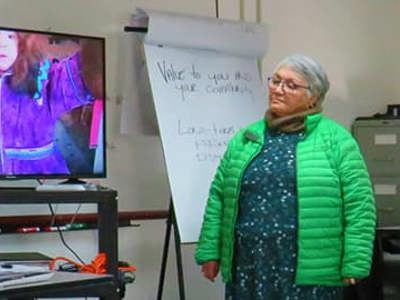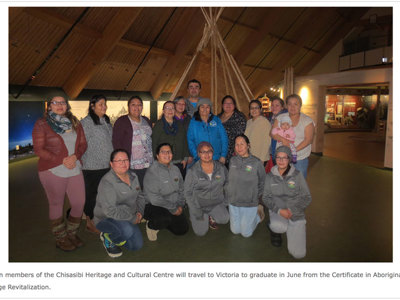
Reclamation and engagement with Indigenous language and cultural practices in Canada is crucial to supporting the continuity of Indigenous knowledge systems, and the health and well-being of Indigenous communities. By participating in Indigenous-led programs in areas such as language revitalization or fine arts, you can actively engage and contribute to cultural continuity.
Indigenous Language and Culture programs
The Certificate in Indigenous Language Revitalization (CILR) provides you with a strong foundation of knowledge and skills for local language revitalization initiatives. You will participate in hands-on learning opportunities that are rooted in traditional knowledge, and practices that are accessible to all learners.
Celebrating 20 years
Last fall CILR celebrated 20 years of Indigenous language revitalization programming! Watch a recording of the event.
This micro-credential in Indigenous Language Documentation provides training for those looking to engage in language documentation and reclamation initiatives. Learners will gain skills in documentation and recording, learn proper protocols for working with knowledge keepers and archival documents, create new materials for Indigenous language revitalization, and gain a better understanding of intellectual ownership of Indigenous intangible cultural property.
Governance in an Indigenous context is the way people make decisions together as a self-defined socio-political community. In the Indigenous Approaches to Governance in Canada micro-certificate program, you will learn about the historical and contemporary challenges facing Indigenous Peoples, including the Indian Act and its impact on Indigenous governance.
The Foundations in Indigenous Fine Arts (FIFA) certificate is offered through a long-standing partnership with the En’owkin Centre, an Indigenous post-secondary institution in Penticton, BC. This unique program was created to develop and nurture Indigenous writers and artists through the two main focuses of creative writing and visual art. Through these Indigenous-led courses at the En’owkin Centre, you can gain credit that can then be applied to a Bachelor of Fine Arts at UVic.
Indigenous Language and Culture courses
The CILR program covers topics such as the historical context for language loss, best practices for language revitalization, language documentation and language learning. You will also develop practical skills and strategies for engaging in Indigenous language reclamation initiatives.
In the FIFA program, you will experience a unique Indigenous-centred environment for your creativity to flourish. The courses are designed to develop specialized skills and artistic expression in various disciplines and mediums, including oral storytelling, writing for television, painting, sculpting and more. Admission to the program is completed through the En’owkin Centre.

Foundations in Indigenous Fine Arts
Curious about developing your skills in creative writing and/or visual arts in an Indigenous context? Explore this unique program in co-operation with the En’owkin Centre.
View program

Indigenous Approaches to Governance in Canada
This micro-certificate provides foundational knowledge on concepts, themes and topics needed to understand and appreciate Indigenous approaches to governance. This includes historical and contemporary challenges facing Indigenous Peoples, including the Indian Act.
View program

Indigenous Cultural Stewardship
ICS provides the knowledge and skills to recognize, revitalize, protect and celebrate Indigenous cultural heritage.
View program

Indigenous Language Documentation
This new micro-credential in Indigenous Language Documentation will give you skills in audio/video recording and editing, working with archival materials, creating resources, and best practices for collecting and safeguarding Elders’ voices and cultural knowledge.
View program

Indigenous Language Revitalization
The Certificate in Indigenous Language Revitalization (CILR) program provides a strong foundation of knowledge and skills to develop practical strategies for local language revitalization initiatives—initiatives that are responsive to the unique needs of each Indigenous nation and organization partnered with.
View program

Intercultural Studies and Practice
The Diploma in Intercultural Studies and Practice (ISP) prepares students to play a productive and socially responsible role in an increasingly multicultural and diverse world. The program aims to develop social responsibility and a clearer understanding and awareness of the complex issues at play in a multicultural society.
View program

Ocean Acoustic Monitoring
Ocean acoustic monitoring empowers community members to easily contribute high-quality, continuous data on noise levels to help better understand and inform policy on the changes that may be impacting the ocean environment over time.
View program

National Indigenous History Month is a time to recognize, learn about and celebrate the rich history, heritage, resilience and diversity of First Nations, Inuit and Métis Peoples.
Read Story
Instructor and Dene/nêhiyaw Métis community member, Kyle Napier, brings over a decade of audiovisual and documentation expertise to his work in Indigenous language revitalization. Through UVic’s Certificate in Indigenous Language Revitalization and other programs, he emphasizes practical recording and data sovereignty skills, while fostering cultural reconnection and healing. His community-based approach bridges generational gaps and equips learners with both the professional tools and personal support needed to keep their languages alive.
Read Story
Richard Van Camp, UVic’s Storyteller-in-Residence, teaches courses on reclaiming family traditions through storytelling, emphasizing self-discovery, healing, and preserving cultural heritage.
Read Story
National Indigenous History Month is a time to recognize, learn about and celebrate the rich history, heritage, resilience and diversity of First Nations, Inuit and Métis Peoples.
Read Story
National Indigenous History Month is a time to recognize, learn about and celebrate the rich history, heritage, resilience and diversity of First Nations, Inuit and Métis Peoples.
Read StoryCongratulations to Kellie Aleck, Audrey Pearson and Amanda Crocker, the recipients of our 2024 Certificate in Indigenous Language Revitalization Awards!
Read Story
Fourteen members of the Chisasibi Heritage and Cultural Centre will travel to Victoria to graduate in June from the Certificate in Aboriginal Language Revitalization. “It’s a proud moment,” Lafond says. “We need to celebrate it.”
Read Story
Congratulations to Continuing Studies staff member Tania Muir on her recent appointment of president within the BC Museums Association (BCMA). At the association’s AGM on Thursday, Oct. 19—after one year as a councilor and two years as vice president—Tania was nominated by the membership and voted in as president.
Read Story
Program Coordinator Tusa Shea talks about the importance and diversity of culture and how our Cultural Resource Management Program supports communities and cultural development.
Read Story
"My language, my heart" is a CBC news story about four Inuit women who are fighting to keep their language alive. Inuinnaqtun (pronounced ee-NOO-ee-NAHK-toon) is traditionally spoken in three Inuit communities in the Western Arctic: Cambridge Bay, Kugluktuk and Ulukhaktok.
Read Story
Mary Jo Hughes is the director of UVic’s Legacy Art Galleries, which consists of some 19,000 art objects. She has yet to personally handle all of them.
Read Story
